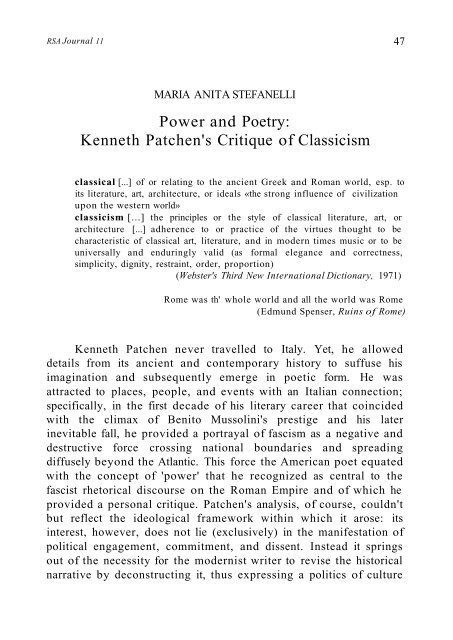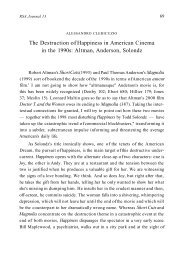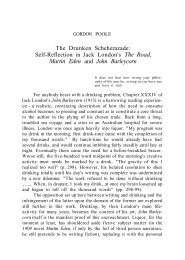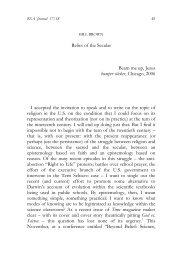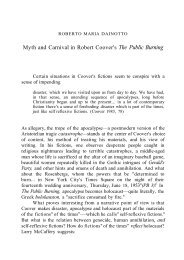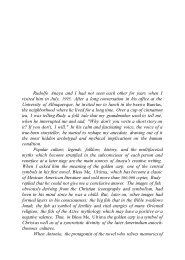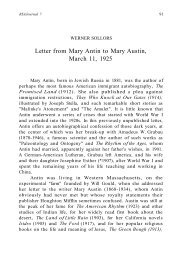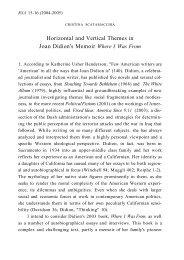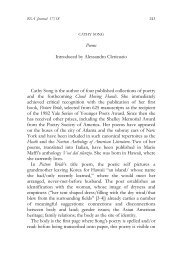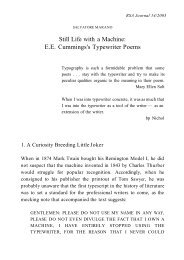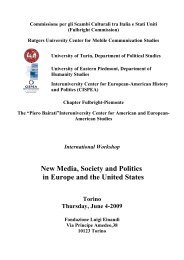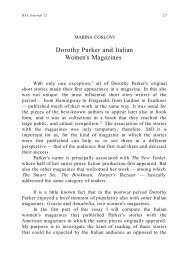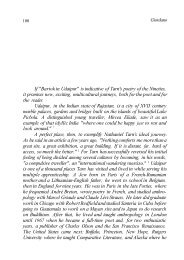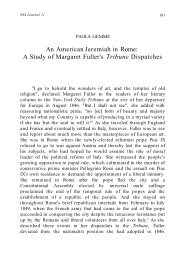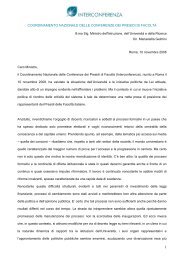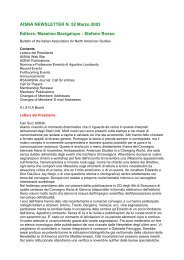Power and Poetry: Kenneth Patchen's Critique of Classicism - aisna
Power and Poetry: Kenneth Patchen's Critique of Classicism - aisna
Power and Poetry: Kenneth Patchen's Critique of Classicism - aisna
Create successful ePaper yourself
Turn your PDF publications into a flip-book with our unique Google optimized e-Paper software.
RSA Journal 11 47<br />
MARIA ANITA STEFANELLI<br />
<strong>Power</strong> <strong>and</strong> <strong>Poetry</strong>:<br />
<strong>Kenneth</strong> <strong>Patchen's</strong> <strong>Critique</strong> <strong>of</strong> <strong>Classicism</strong><br />
classical [...] <strong>of</strong> or relating to the ancient Greek <strong>and</strong> Roman world, esp. to<br />
its literature, art, architecture, or ideals «the strong influence <strong>of</strong> civilization<br />
upon the western world»<br />
classicism [...] the principles or the style <strong>of</strong> classical literature, art, or<br />
architecture [...] adherence to or practice <strong>of</strong> the virtues thought to be<br />
characteristic <strong>of</strong> classical art, literature, <strong>and</strong> in modern times music or to be<br />
universally <strong>and</strong> enduringly valid (as formal elegance <strong>and</strong> correctness,<br />
simplicity, dignity, restraint, order, proportion)<br />
(Webster's Third New International Dictionary, 1971)<br />
Rome was th' whole world <strong>and</strong> all the world was Rome<br />
(Edmund Spenser, Ruins <strong>of</strong> Rome)<br />
<strong>Kenneth</strong> Patchen never travelled to Italy. Yet, he allowed<br />
details from its ancient <strong>and</strong> contemporary history to suffuse his<br />
imagination <strong>and</strong> subsequently emerge in poetic form. He was<br />
attracted to places, people, <strong>and</strong> events with an Italian connection;<br />
specifically, in the first decade <strong>of</strong> his literary career that coincided<br />
with the climax <strong>of</strong> Benito Mussolini's prestige <strong>and</strong> his later<br />
inevitable fall, he provided a portrayal <strong>of</strong> fascism as a negative <strong>and</strong><br />
destructive force crossing national boundaries <strong>and</strong> spreading<br />
diffusely beyond the Atlantic. This force the American poet equated<br />
with the concept <strong>of</strong> 'power' that he recognized as central to the<br />
fascist rhetorical discourse on the Roman Empire <strong>and</strong> <strong>of</strong> which he<br />
provided a personal critique. <strong>Patchen's</strong> analysis, <strong>of</strong> course, couldn't<br />
but reflect the ideological framework within which it arose: its<br />
interest, however, does not lie (exclusively) in the manifestation <strong>of</strong><br />
political engagement, commitment, <strong>and</strong> dissent. Instead it springs<br />
out <strong>of</strong> the necessity for the modernist writer to revise the historical<br />
narrative by deconstructing it, thus expressing a politics <strong>of</strong> culture
48<br />
RSA Journal 11<br />
opposed to the philosophy <strong>of</strong> order <strong>and</strong> rule fostered by classicism,<br />
<strong>and</strong> reaching out towards a utopian space characterized by a new<br />
ecology where center <strong>and</strong> margin are subverted. The unified <strong>and</strong><br />
totalising knowledge promoted by the Romans <strong>and</strong> assumed by the<br />
regime as an ideological paradigm for the twentieth century is<br />
fragmented, parcelled <strong>and</strong> then accumulated in a new r<strong>and</strong>om-like<br />
pattern that reflects its own absurdity.<br />
Eager to affirm the identity <strong>of</strong> the doctrine he was<br />
promulgating, the Italian dictator had proclaimed:<br />
Rome is our point <strong>of</strong> departure <strong>and</strong> point <strong>of</strong> reference; it is our symbol <strong>and</strong>,<br />
if you like, our myth. We dream <strong>of</strong> a Roman Italy, an Italy that is wise <strong>and</strong><br />
strong, disciplined <strong>and</strong> imperial. Much <strong>of</strong> the spirit <strong>of</strong> Ancient Rome is<br />
being born again in Fascism; the Lictorian fasces are Roman, our war<br />
machine is Roman, our pride <strong>and</strong> our courage are Roman too. 1<br />
The Roman fascis—composed <strong>of</strong> a bundle <strong>of</strong> virgae (elms, or<br />
birch rods) <strong>and</strong> a securis (scythe) bound together by a strap, with a<br />
projecting axe head at its center to make it hard as well as<br />
providing a h<strong>and</strong>le—was called by Titus Livius insignia imperii,<br />
<strong>and</strong> was linked with the idea <strong>of</strong> power (the power <strong>of</strong> the Roman<br />
lawmakers, consuls <strong>and</strong> magistrates), which, in its turn, was<br />
inherent in the political discourses <strong>of</strong> the hegemonic group as well<br />
as in the texts <strong>of</strong> tradition <strong>and</strong> history books." The classical Roman<br />
conception <strong>of</strong> gr<strong>and</strong>eur became pervasive, <strong>and</strong> the attention <strong>of</strong> the<br />
world focussed on the "fated hills <strong>of</strong> Rome," where the Empire had<br />
reappeared: "[T]he cult <strong>of</strong> Rome <strong>and</strong> being Roman, one <strong>of</strong> the<br />
values enshrined in Fascist rhetoric from the start," writes one<br />
commentator, "grew to astonishing proportions, assuming external<br />
signs <strong>and</strong> rituals that were increasingly formal." 3<br />
Mussolini's initially inspired classical 'mythic' model soon<br />
turned into the repressive norm dictated by his nationalistic <strong>and</strong><br />
imperialistic aims. A condottiero-like figure, he came to power in<br />
1922 <strong>and</strong> proclaimed Italy a dictatorship in 1925. 4 The Roman<br />
model, however, was never in question: the present regime was—<br />
as has been described—"the revolutionary continuation <strong>of</strong> the<br />
original 'Roman revolution' <strong>of</strong> the first century B.C., with the<br />
imperial Roman state considered the predecessor <strong>of</strong> the totalitarian
RSA Journal 11 49<br />
Fascist state." 5 Hence, the objective: promoting classicism while<br />
aiming at expansion. The military action in Ethiopia, which led to<br />
the proclamation <strong>of</strong> the empire, was just the beginning; 6 later<br />
aggressive measures would almost always be accompanied by<br />
proud declarations <strong>of</strong> Roman heritage.<br />
To the pacifist Patchen the connection between Mussolini's<br />
Italy <strong>and</strong> ancient Rome must have been quite disturbing. The<br />
classical tradition (which had inspired William Shakespeare <strong>and</strong><br />
from which James Joyce had drawn, Ezra Pound <strong>and</strong> William<br />
Carlos Williams were drawing) could not be simply rejected on<br />
account <strong>of</strong> Roman imperialism <strong>and</strong> pretended universalism, just as<br />
bourgeois culture could not be demolished in favour <strong>of</strong> its<br />
proletarian counterpart. Despite leftist appeals for commitment in<br />
art <strong>and</strong> for a class-partisan literature which would oppose liberal<br />
tendencies, Marxist intellectuals would be cautious <strong>and</strong>, along the<br />
lines promoted by people like Vladimir Lenin <strong>and</strong> Leon Trotsky,<br />
would recognize the values <strong>of</strong> previous bourgeois art, which they<br />
anticipated would be absorbed by socialist culture. 7 As far as<br />
<strong>Patchen's</strong> position was concerned, the publication <strong>of</strong> poems such<br />
as "Lenin" (in The Rebel Poet, 1932) <strong>and</strong> "Joe Hill Listens to the<br />
Praying" (in New Masses, 1934) signalled his political engagement,<br />
the latter also earning him a reputation as a proletarian poet that<br />
was probably beyond <strong>Patchen's</strong> own intentions. 8 His objective, in<br />
fact, was not that <strong>of</strong> showing his explicit commitment to the Left,<br />
even if he felt the need to problematize the historical <strong>and</strong> concrete<br />
aspects <strong>of</strong> contemporary reality (something he did, in his best<br />
poems, less with passionate revolutionary tones than allowing the<br />
ideology to emerge from the juxtaposition, or dramatization, <strong>of</strong><br />
situations). Historical <strong>and</strong> political references, in <strong>Patchen's</strong> poetic<br />
language, occur as nodes establishing dialectical links between past<br />
<strong>and</strong> present. Those elements, among a multitude <strong>of</strong> others, are<br />
placed in contexts that prove both socially meaningful <strong>and</strong><br />
aesthetically suggestive, while their interrelationship—working<br />
effectively against the received interpretation <strong>of</strong> texts <strong>and</strong> signs—<br />
produces a new synthesis.<br />
As Terry Eagleton remarked in his reappraisal <strong>of</strong> Marxist<br />
literary theory: "Marxism alone has sustained the eminently
50<br />
RSA Journal 11<br />
dialectic belief, inimical at once to romantic nostalgia <strong>and</strong><br />
modernizing triumphalism, that modern history has been<br />
inseparably civilization <strong>and</strong> barbarism." 9 The history <strong>of</strong> Rome <strong>and</strong><br />
the creation <strong>of</strong> the Roman Empire, Patchen would have agreed, are<br />
no exceptions: they were not unaffected by such play. The very<br />
notion <strong>of</strong> romanitas—namely that "<strong>of</strong> belonging politically <strong>and</strong><br />
emotionally (or both) to a universal order <strong>and</strong> culture associated in<br />
one way or another with the Roman Empire"—originatcd from<br />
bloodshed <strong>and</strong> coercion, <strong>and</strong> then came to define, conventionally,<br />
a single political entity, in which the ruling élite <strong>and</strong> the subject<br />
peoples "came to share for the most part a common symbolic<br />
universe variously expressed in material, cultural <strong>and</strong> political<br />
terms, <strong>and</strong> enforced by the power <strong>of</strong> the army, pacts <strong>of</strong> alliance,<br />
<strong>and</strong> the authority <strong>of</strong> the emperor, all founded on the principle<br />
<strong>of</strong> law." 10 The question is whether, vis-à-vis the very visible<br />
spectacularization <strong>of</strong> power that fascism set up, an enforcement <strong>of</strong><br />
the positive notion <strong>of</strong> romanitas could not be provided by the<br />
individual's interaction with its cultural (<strong>and</strong> artistic) artefacts that<br />
would ensure a redefinition (<strong>and</strong> reabsorption) <strong>of</strong> the past in terms<br />
<strong>of</strong> cultural progress. If one worked to recapture the original<br />
meanings, one could open up avenues for new, until then unseen,<br />
possibilities that might re-direct one's interpretation <strong>of</strong> the past <strong>and</strong><br />
reach—because <strong>of</strong> the possibilities for distortion intrinsic in<br />
language—different <strong>and</strong> de-centered representations. Within the<br />
argument about the supposed modernist rejection <strong>of</strong> the past, the<br />
interest in an alternative appreciation <strong>of</strong> history would be revived.<br />
<strong>Patchen's</strong> major effort to penetrate into the gaps <strong>of</strong> past times<br />
to recapture broken, discarded <strong>and</strong> discontinuous language<br />
fragments (from journalistic snippets to short passages drawn from<br />
historical or literary documents), which he re-used with an<br />
increased awareness <strong>of</strong> their cultural significance is at the basis <strong>of</strong><br />
his early poetic experiments. His underst<strong>and</strong>ing <strong>of</strong> history <strong>and</strong><br />
culture led him to penetrate the recesses <strong>of</strong> language to discover its<br />
germ <strong>and</strong> possible projections. In keeping with both Trotsky's<br />
claim that artistic creation is "a deflection, a changing <strong>and</strong> a<br />
transformation <strong>of</strong> reality, in accordance with the peculiar laws <strong>of</strong><br />
art" 11 <strong>and</strong> the modernist exploitment <strong>of</strong> tradition as something to be
RSA Journal 11 51<br />
manipulated, dismantled, <strong>and</strong> ironically reassembled, Patchen<br />
engaged in the alchemical processing <strong>of</strong> stale linguistic forms that<br />
he reorganized into new arrangements, thus transforming (i.e.<br />
deforming, refracting, dissolving, to use Eagleton's lexicon) 12 the<br />
[classical] static object into a dynamic model. This essay will show<br />
how Patchen first <strong>of</strong>fered—by means <strong>of</strong> decoupage, disarrangement,<br />
<strong>and</strong> displacement—a deformed <strong>and</strong> parodic version <strong>of</strong> the fascist<br />
cult <strong>of</strong> romanitas based upon a manipulation <strong>of</strong> Italy's past classical<br />
tradition; then—by experimenting with modern phenomena such as<br />
speed <strong>and</strong> flight—proceeded towards a radical innovation in<br />
representation; <strong>and</strong> finally presented a re-interpretation, in cultural<br />
terms, <strong>of</strong> the past. By deconstructing the textual material in which<br />
the greatness <strong>of</strong> Rome was recorded, he supplied his own postheroic<br />
<strong>and</strong> post-humanist view <strong>of</strong> Rome's power, thereby inscribing<br />
a new way <strong>of</strong> representing classicism. The result <strong>of</strong> his creative<br />
intervention will now be evaluated through a discussion <strong>of</strong> four<br />
poems from Cloth <strong>of</strong>the Tempest.<br />
* * *<br />
Among the earliest collections selected by the author for<br />
inclusion in the New Directions 1968 edition <strong>of</strong> Collected Poems<br />
are: Before the Brave (1936), First Will <strong>and</strong> Testament (1939), <strong>and</strong><br />
Cloth <strong>of</strong> the Tempest (1943), each <strong>of</strong> them venting <strong>Patchen's</strong> anger<br />
at manifest or ambiguous forms <strong>of</strong> fascism. While, however, the<br />
tone <strong>of</strong> the earlier poems is <strong>of</strong>ten polemical <strong>and</strong> sarcastic, in the<br />
third collection Patchen supplies a cultural evaluation <strong>of</strong> the<br />
classical language <strong>of</strong> imperialism as displayed in the enterprises <strong>of</strong><br />
the Greeks <strong>and</strong> Romans. Through the Roman ("The Destruction <strong>of</strong><br />
Carthage", "Egypt", "The Appian Way", <strong>and</strong> "Attila") <strong>and</strong> Greek<br />
("The Age <strong>of</strong> Pericles" <strong>and</strong> "The Empire <strong>of</strong> Persia") poems, Patchen<br />
annihilates the deadly fixed language <strong>of</strong> the winners, <strong>and</strong><br />
promotes, by lending them his own voice, alongside the actions <strong>of</strong><br />
the resisters, the inarticulate cries <strong>and</strong> dynamic silence <strong>of</strong> the<br />
victims, thereby anticipating the discovery <strong>of</strong> the sound <strong>of</strong> silence<br />
later exploited by the artists <strong>of</strong> the sixties. Besides he supplies the<br />
model <strong>of</strong> a politics <strong>of</strong> culture opposed to centralisms or mainstreams
52<br />
RSA Journal 11<br />
as <strong>of</strong>fspring <strong>of</strong> classicism <strong>and</strong> favouring instead the decentering <strong>of</strong><br />
man in the universe.<br />
In Before the Brave <strong>and</strong> First Will <strong>and</strong> Testament Italian names<br />
echoing tragically contemporary facts are evoked: Mussolini <strong>and</strong><br />
blackshirt leader Italo Balbo (1896-1940), the dictator's dashing <strong>and</strong><br />
charismatic confidant who exemplified the ideals <strong>of</strong> fascist Italy<br />
during the 1920s <strong>and</strong> '30s; Palazzo Venezia (where Mussolini's<br />
state apartments had been installed in 1929) overlooking the piazza<br />
that opened on the triumphal way called "via dell'Impero"; Lauro<br />
de Bosis, poet <strong>and</strong> activist who dropped anti-Fascist manifestoes<br />
from his aircraft over Rome before finding his death when his<br />
plane plunged into the sea <strong>of</strong>f-Corsica; Ignazio Silane (1900-1978),<br />
a politically active intellectual <strong>and</strong> writer forced into exile by the<br />
fascists in 1927. Those names Patchen traced, read about, <strong>and</strong><br />
researched: names he found interwoven with the rhetoric <strong>of</strong> power<br />
<strong>and</strong> that would lead him to develop a strategy <strong>of</strong> resistance to the<br />
classical notion <strong>of</strong> imperialism.<br />
Rome as a historical-political knot—without considering, that<br />
is, its creative achievements in the field <strong>of</strong> the arts—is, to Patchen,<br />
not an exotic location, but an alarmingly near one. The poet<br />
proclaims it with bitterness in the opening lines, where the<br />
connection <strong>of</strong> the Italian city with the political power is<br />
emphasized by its coupling with the German one:<br />
I shall be with you when the hollow faces<br />
on Time's screen stare at you leaning forward<br />
leaving no distance from here to Berlin or Rome<br />
("Loyalty Is the Life You Are," Before the Brave, CP, p. 20)<br />
Patchen recaptures the images <strong>of</strong> the empty effigies <strong>of</strong> T.S.<br />
Eliot's "hollow men," conceived in the first half <strong>of</strong> the '20s after<br />
World War I, <strong>and</strong> replaces—at the eve <strong>of</strong> a new war, a decade<br />
later—their unfitness to live within time (history) with the unfitness<br />
to live within space (geography), paradoxically annulling the<br />
[political] distance between Europe <strong>and</strong> America. <strong>Patchen's</strong><br />
perspective reverses Eliot's religious optimism that had led to the<br />
filling <strong>of</strong> the abyss <strong>of</strong> history with the mysterious Shadow <strong>of</strong> God,<br />
<strong>and</strong> posits the future as an ambiguous play between depravity <strong>and</strong>
RSA Journal 11 53<br />
honesty, hate <strong>and</strong> pity, agnosticism <strong>and</strong> belief, madness <strong>and</strong> sanity.<br />
With the same spirit William Carlos Williams, through the game <strong>of</strong><br />
ascent <strong>and</strong> descent, creation <strong>and</strong> destruction, order <strong>and</strong> disorder,<br />
disjunction <strong>and</strong> conjunction had subverted the canons <strong>and</strong><br />
traditions <strong>of</strong> the European literary culture towards which Eliot had<br />
turned. Not animated, like Williams, by the combativeness <strong>of</strong> the<br />
well-established writer, Patchen was nevertheless stimulated by an<br />
antiacademic <strong>and</strong> antiliterary spirit that has led one critic to see, in<br />
his discharge <strong>of</strong> the conventional in favour <strong>of</strong> a re-definition <strong>and</strong><br />
re-orientation in space <strong>and</strong> time, an affinity with the Surrealists. 13<br />
Fascism in Germany or Italy, Patchen is convinced, is a<br />
pathological form emerging from within <strong>and</strong> spreading freely to other<br />
directions, towards the assimilation <strong>of</strong> other societies, leading to the<br />
triumph <strong>of</strong> treason <strong>and</strong> hate. 14 The proximity <strong>of</strong> the United States <strong>and</strong><br />
the Europe <strong>of</strong> the dictators announced here comes up again in<br />
another poem <strong>of</strong> the collection, through the a-syntagmatic relationship<br />
<strong>of</strong> adjectives <strong>and</strong> nouns ("British American Japanese/French Italian<br />
battleships cruisers submarines torpedo-boats", CP, p. 40) <strong>and</strong> proper<br />
names ("Morgan Hoover Mussolini", CP, p. 40) as well as through the<br />
juxtaposition <strong>of</strong> sentences ("We present gas/Hitler <strong>of</strong>fers/Death Death",<br />
CP, p. 40). In this short poem—one eighteen-line long sentence, clear<br />
<strong>of</strong> punctuation <strong>and</strong> sustained by strained syntax—Patchen anticipates<br />
the absurdity <strong>of</strong> war by creating, with linguistic means, a panorama <strong>of</strong><br />
frightfulness reflected in a mad design.<br />
The leaders <strong>of</strong> Italy <strong>and</strong> Germany—the Roman dux <strong>and</strong> the<br />
German Führer—come to life in the sketch that <strong>of</strong> them was given<br />
by former British MP W.E.D. Allen: a rhetorical description <strong>of</strong> the<br />
physical force triumphant, printed as epigraph to the poem "Leaflet<br />
(Two)" (Before the Brave, CP, pp. 29-30). Shadows acquire a body;<br />
thus the universal Warrior Hero takes shape as Mussolini or Hitler<br />
preceding their condottieri (which translates the Latin duces), 15<br />
merciless Footmen like Balbo <strong>and</strong> Goering. The picture contextualizes,<br />
through suggestion, a dramatic historic date: March 23, 1933, when<br />
Hitler was granted dictatorial power. By way <strong>of</strong> contrast, the poem<br />
opens with a memento <strong>of</strong> the dead comrades, who, having failed<br />
to reach agreement with Schleicher, were dispatched into prisons<br />
<strong>and</strong> camps on account <strong>of</strong> their active engagement as union leaders.
54<br />
RSA Journal 11<br />
It is a brief, sympathetic recording <strong>of</strong> unheard voices <strong>and</strong> suffocated<br />
suffering, as well as a homage to those who have reached the<br />
quietness <strong>of</strong> death. A flash follows: Adolf Hitler pictured as an airman,<br />
coming back from Italy (probably from Venice, where the first<br />
meeting with Mussolini took place in 1934) <strong>and</strong> l<strong>and</strong>ing to enter the<br />
Kroll Opera House, where the Reichstag (the members <strong>of</strong> the<br />
government doomed to lose all significant power after passing Hitler's<br />
1934 Enabling Act) had its seat after the burning <strong>of</strong> the Reichstag<br />
building (February 27, 1933). The massive amount <strong>of</strong> political<br />
intrigues, rumors <strong>and</strong> disorder that framed Hitler's seizure <strong>of</strong> power<br />
are evoked by the proper names recurring in the newspapers <strong>and</strong><br />
documents <strong>of</strong> the Nazi years. Besides mentioning Hermann Goering,<br />
whose Aufbau Einer Nation (1934) declared the Communists enemies<br />
<strong>of</strong> the State that had to be dealt with ruthlessly, references are made<br />
to: Engbert Dollfuss (1822-1934), Chancellor <strong>of</strong> Austria, who, pressing<br />
for union with Germany, outlawed both the Communist <strong>and</strong> the<br />
Austrian Nazi party, <strong>and</strong> was later assassinated in a Nazi uprising;<br />
former army <strong>of</strong>ficer Kurt von Schleicher, then Chancellor <strong>of</strong> Germany<br />
as Hitler's predecessor for 57 days; Ernst Rohm, the leader <strong>of</strong> the Nazi<br />
storm troopers called SA, also murdered by the Nazis; Karl Ernst, SA<br />
leader <strong>of</strong> Berlin, <strong>and</strong> Heines, SA leader <strong>of</strong> Silesia. For the Nazi<br />
criminals the same sarcastic tone that signals <strong>Patchen's</strong> contempt is<br />
used; as a matter <strong>of</strong> fact the poet mentions Hitler's "ridiculous<br />
moustache," "little Dollfuss," <strong>and</strong> the "brood <strong>of</strong> ugly ducks" in which<br />
Schleicher, Rohm, Ernst, <strong>and</strong> Heines are grouped. The rhythmic pace<br />
<strong>of</strong> the italicised couplet <strong>and</strong> the three successive lines creates a tragic<br />
contrast:<br />
Oh l<strong>and</strong> alive with hypocrites <strong>and</strong> harlots:<br />
hang wreaths upon the butchered West.<br />
And the orator blew into his h<strong>and</strong>s, pulling<br />
a pamphlet "Pledge <strong>of</strong> Peace" from out his pocket,<br />
he neatly shot a thous<strong>and</strong> pacifists <strong>and</strong> two nations.<br />
(CP, p. 29)<br />
The lines, regularly stressed, echo the heavy stride <strong>of</strong> the<br />
reborn class <strong>of</strong> condottieri, <strong>of</strong>ten treacherous <strong>and</strong> corrupt members<br />
<strong>of</strong> the aristocracy in Renaissance Italy—second-rate rulers whose
RSA Journal 11 55<br />
leadership would prove fatal, i.e. would lead people to their ruin<br />
<strong>and</strong> that <strong>of</strong> others. Paradoxically <strong>and</strong> absurdly, the "Pledge <strong>of</strong><br />
Peace" is contradicted by the guarantee <strong>of</strong> prevarication <strong>and</strong><br />
murder.<br />
Another contemporary context for Rome is supplied by "Class<br />
<strong>of</strong> 1934" that—against a historical patchwork reflected through a<br />
juxtaposition <strong>of</strong> declaratives, questions, comm<strong>and</strong>s, <strong>and</strong> exclamations<br />
interspersed with quotations from not always immediately<br />
recognizable texts — 16 mentions the involvement <strong>of</strong> "British<br />
American Japanese/French Italian battleships cruisers submarines,<br />
torpedo-boats" in World War I. The reference is to the batteries<br />
that evolved, after the war, into more powerful instruments for<br />
attacks against the enemy ('torpedoes', for instance, were<br />
upgraded into destroyers). The 'earth' as 'a bitch gone crazy'—a<br />
development <strong>of</strong> Ezra Pound's 'old bitch gone in the teeth'—is the<br />
subject <strong>of</strong> a speech some persona is supposedly going to<br />
pronounce. The quotation from Hugh Selwyn Mauberley (1920) is<br />
carefully chosen as echoing a text that, in a controlled style<br />
pregnant with literary allusions <strong>and</strong> employing the Greek script<br />
rigorously apropos, cries out disparagement for an age that<br />
dem<strong>and</strong>s the sacrifice <strong>of</strong> life to honor, a tradition based upon<br />
classicism. Pound had written:<br />
There died a myriad,<br />
And <strong>of</strong> the best, among them,<br />
For an old bitch gone in the teeth,<br />
For a botched civilization,<br />
Charms, smiling at the good mouth<br />
Quick eyes gone under earth's lid,<br />
For two gross <strong>of</strong> broken statues,<br />
For a few thous<strong>and</strong> battered books.<br />
The sense <strong>of</strong> 'bankruptcy' <strong>and</strong> 'futility' that F.R. Leavis<br />
recognized as promoting the 'pressure <strong>of</strong> experience' one feels in<br />
Mauberley, was not verified by Patchen, as it was later by Pound in<br />
the Cantos, against the paradoxical structure <strong>of</strong> an ideal/classical<br />
order; 17 it instead entered a system that has horror as its foundation
56<br />
RSAJournal 11<br />
<strong>and</strong> that only madness can validate, both in terms <strong>of</strong> content <strong>and</strong><br />
formally.<br />
A seal is impressed in the middle <strong>of</strong> the poem: '1929 October<br />
24', the infamous date <strong>of</strong> the Wall Street Crash, that introduces a<br />
complex ironic context in which the set <strong>of</strong> stairs leading to the<br />
Italian dictator's Roman residence becomes—via the evocation <strong>of</strong><br />
St. Augustine's creation <strong>of</strong> the city <strong>of</strong> Man <strong>and</strong> the city <strong>of</strong> God—a<br />
grim counterpart <strong>of</strong> the stairs leading to Heaven:<br />
This is<br />
the strain the eternal strain the Lord <strong>of</strong> all things loves Billy bully Billy Hearst<br />
barbed wire a crown <strong>of</strong> homos sharpshooters<br />
"though<br />
I cannot be a soldier, I can encourage them by dying" Shanghai's Big<br />
Sword Corps proves the cheering 1929 October 24 in every pot a chicken<br />
a pot in every belly Morgan Hoover Mussolini come to bury them not<br />
to Down on your knees Palazzo Venezia watch the stairs I'm coming up<br />
Watch that guy in the gray suit thou dearest Augustine all is gone gone<br />
gone. What did they say when you told them Where bright angel feet have<br />
trod They said O.<br />
(CP, p. 40)<br />
Here religious, comic, <strong>and</strong> sinister references mix, while the<br />
tapestry Patchen is weaving results in a rough texture that may<br />
have been modelled on some <strong>of</strong> the most political <strong>of</strong> Pound's<br />
Cantos. The Depression period was far from gone, <strong>and</strong> <strong>Patchen's</strong><br />
mood was imbued with anger at the socio-economic system; the<br />
experimental quality <strong>of</strong> his writing, however, was that <strong>of</strong> the<br />
modernist collage forms, releasing original sparks <strong>of</strong> engagement,<br />
protest, <strong>and</strong> rebellion accompanied by glows <strong>of</strong> love for mankind,<br />
religious emotion, <strong>and</strong> respect, beside devotion, for art.<br />
Another poem <strong>of</strong> the collection, "Poem in the Form <strong>of</strong> a<br />
Letter: to Lauro de Bosis", (CP, pp. 30-4), is devoted to a victim <strong>of</strong><br />
fascism whose political enterprise was strangely linked with his<br />
art. 18 On October 3, 1931 de Bosis, author <strong>of</strong> the poetic drama<br />
Icaro, flew over Rome, to scatter thous<strong>and</strong>s <strong>of</strong> leaflets over the city<br />
with the purpose <strong>of</strong> appealing to its citizens to rise against the<br />
despotic fascist government; but he never returned from his<br />
journey. 19 By interweaving dream images with contemporary war
RSA Journal 11 57<br />
images, <strong>and</strong> by interspersing those with the fragments <strong>of</strong> a prayer<br />
(Our Father), Patchen transformed the event into poetry:<br />
Fire <strong>and</strong> wings, De Bosis, soaring above<br />
Rome <strong>and</strong> Mussolini into the night<br />
in a clear flame over the cities<br />
<strong>and</strong> the waters; into the h<strong>and</strong>s<br />
<strong>of</strong> those who walk with heads high<br />
down lanes <strong>of</strong> men through the jeers<br />
<strong>and</strong> bayonets. Head, quick <strong>and</strong> laurelscarred<br />
from the trodden dust into the ages<br />
while motors drone in prayer our father<br />
which art Mussolini fascist airmen take <strong>of</strong>f<br />
in pursuit chanting<br />
hail <strong>and</strong> hallowed be they name from loss<br />
<strong>of</strong> sleep the blood warm<br />
drenching an appleblossom-sleep<br />
through the skull<br />
the spiders <strong>of</strong> death<br />
welling into the throat machine guns<br />
exultantly thy kingdom come<br />
over the poet's head bent in a moment.<br />
(CP, pp. 30-1)<br />
In keeping with the modernist formula, Patchen breaks the<br />
logics <strong>of</strong> syntax <strong>and</strong> organizes his poem on the simultaneous<br />
juxtaposition <strong>of</strong> fragments dynamically structured on the page <strong>and</strong><br />
rhythmically cadenced within the flow <strong>of</strong> verse as to suggest the<br />
mechanical movement <strong>of</strong> technology's contemporary products.<br />
The flight myth—also a tapas in Italian avant-garde poet Filippo<br />
Tommaso Marinetti's imagery—is embodied in the figure <strong>of</strong> the<br />
Italian intellectual activist as man <strong>and</strong> artist. Ironically, de Bosis<br />
succumbs to the very regime that promoted flight by merging it<br />
with the myth <strong>of</strong> modernism <strong>and</strong> futurism. Patchen, playing with<br />
light, speed, colour, <strong>and</strong> perspective from the air, subverts the<br />
classical myth <strong>and</strong> transforms Icarus into a contemporary hero<br />
taking <strong>of</strong>f aboard an aeroplane to encounter his death. The white<br />
leaflets addressed to the people <strong>and</strong> the King coming down from<br />
the sky over Villa Borghese, Pincio, Piazza di Spagna, <strong>and</strong> the<br />
Quirinale gardens are themselves evocative <strong>of</strong> the positive role <strong>of</strong>
58<br />
RSA Journal 11<br />
chance <strong>and</strong> disorder, as opposed to the fixed, rigorous order <strong>of</strong><br />
classicism.<br />
First Will <strong>and</strong> Testament—published when all Europe was at<br />
war again—reaffirms that all forms <strong>of</strong> fascism are to be banned; so<br />
Patchen calls on Silone to testify it in the epigraph to "The<br />
Executions in Moscow" (CP, pp. 134-37). Using the sculpting<br />
power <strong>of</strong> poetry, he transcribes a historical date, in italics, at the<br />
end <strong>of</strong> his poem. 'October 1937' marks the peak <strong>of</strong> repression <strong>and</strong><br />
terror in the period <strong>of</strong> Joseph Stalin's rule as absolute dictator <strong>of</strong><br />
the Soviet Union. In the course <strong>of</strong> the poem a woman's voice,<br />
insisting, unrepressed, not hushed, vainly wonders over the nature<br />
<strong>of</strong> war. Men like Stalin, Hitler, <strong>and</strong> Mussolini are embodiments <strong>of</strong><br />
the leader as envisaged by the classical myth <strong>of</strong> gr<strong>and</strong>eur: the dux,<br />
a modern Caesar, the restorer <strong>of</strong> the Augustan age. 20<br />
<strong>Patchen's</strong> appreciation for the rulers <strong>of</strong> the world is<br />
persistently biting. In "I DON'T WANT TO STARTLE YOU, but they<br />
are going to kill most <strong>of</strong> us" the reference is to a sinister "immense<br />
hall protected by barbed wire/And machine guns" where a<br />
company <strong>of</strong> friends is consuming a cannibalistic meal:<br />
[...] Hitler, Benny Mussolini, Roosevelt, <strong>and</strong> all<br />
The big <strong>and</strong> little wigs were at the table, F.D.'s arm around Adolf,<br />
Chiang Kai-shek's around the Pope, all laughing fit to kill.<br />
As soon as a treaty was signed, out <strong>of</strong> the window it went;<br />
But how they fumbled at each other under the table!<br />
I snatched up a menu:<br />
Grilled Japanese Soldier on Toast<br />
Fried revolutionaries à la Dirty Joe<br />
Roast Worker Free Style<br />
Hamstrung Colonial Stew, British Special<br />
Gassed Child's Breast, International Favorite<br />
Wine list—Blood 1914, '15, '17, '23, '34, '36, '40, etc.<br />
(CP, pp. 155-56)<br />
Colloquial idiom, quick pace, <strong>and</strong> suggested small-time<br />
conversation are set in a context <strong>of</strong> horror, where a universal,<br />
large-scale destruction <strong>of</strong> humanity is anticipated. The turgid style<br />
in which Patchen lists the items on the macabre menu clearly<br />
reflects the rhetoric <strong>of</strong> Marinetti's futurist cookbook, where a group
RSA Journal 11 59<br />
<strong>of</strong> soldiers who "will have to get into a lorry to enter the line <strong>of</strong> fire<br />
at four, or go up in an aeroplane to bomb cities or counter-attack<br />
enemy flights", instead <strong>of</strong> finding comfort in "the grieving kisses <strong>of</strong><br />
a mother, <strong>of</strong> a wife, <strong>of</strong> children" sit around a table where they are<br />
served a "Drum Roll <strong>of</strong> Colonial Fish", then some "Raw Meat Torn<br />
by Trumpet Blasts" <strong>and</strong>, before leaving, the 'Throat Explosion, a<br />
solid liquid consisting <strong>of</strong> a pellet <strong>of</strong> parmesan cheese steeped in<br />
Marsala.' 21 <strong>Patchen's</strong> sarcastic tone <strong>and</strong> mood are even closer to<br />
Marinetti's "<strong>of</strong>ficial dinner", where the Futurist "Aeropoet" supplies<br />
three recipes:<br />
1) "The Cannibals sign up at Geneva": a plate <strong>of</strong> various raw<br />
meats from which the guests cut what they want,<br />
seasoning the pieces by dipping them into little bowls <strong>of</strong><br />
oil, vinegar, honey, red pepper, ginger, sugar, butter,<br />
saffron risotto or old barolo wine.<br />
2) "The League <strong>of</strong> Nations": little black salami sausages <strong>and</strong><br />
tiny pastries filled with chocolate custard, floating in a<br />
cream <strong>of</strong> milk, eggs <strong>and</strong> vanilla. (While this dish is being<br />
tasted, a twelve-year old Negro boy, hidden under the<br />
table, will tickle the ladies' legs <strong>and</strong> pinch their ankles.)<br />
3) "The Solid Treaty": a multi-colored castle <strong>of</strong> nougat with,<br />
inside, very tiny nitro-glicerine bombs which explode now<br />
<strong>and</strong> then perfuming the room with the typical smell <strong>of</strong><br />
battle. 22<br />
Marinetti's wish to free words from stale contexts <strong>and</strong><br />
promote anti-bourgeois ideas in art appealed to Patchen who, at<br />
27, was gathering his materials to experiment with representation.<br />
It is worth noting that in the same poem Mussolini's name, for all<br />
his fascist love <strong>of</strong> classicism <strong>and</strong> Rome, is reduced to an Anglo<br />
Saxon vernacular diminutive: "Benny".<br />
* * *<br />
In the late thirties—when Patchen was presumably working<br />
on Cloth <strong>of</strong> the Tempest—Mussolini <strong>and</strong> Hitler ventured into war,
60 RSA Journal 11<br />
with ensuing disaster. <strong>Patchen's</strong> reading into history was his<br />
"voyage to Pagany", the only trip he could undertake considering<br />
his lack <strong>of</strong> health <strong>and</strong> means. Paved with words <strong>and</strong> figures, the<br />
itinerary he covered came alive in the destiny <strong>of</strong> the vast numbers<br />
<strong>of</strong> victims: 250,000 Hasdrubal's subjects killed by Scipio's army at<br />
Carthage in 146 B.C.; 1,600 Egyptian slaves who probably met their<br />
death in the days <strong>of</strong> hard labour, before an end was put to Mark<br />
Antony's surreptitious ambitions; 6,000 followers <strong>of</strong> would-be<br />
gladiator Spartacus who led a rebellion <strong>of</strong> slaves against Rome in<br />
73 B.C. In his encounter with the historical past Patchen detects<br />
Roman traces in three different continents: Africa, Asia, <strong>and</strong> Europe,<br />
each spot marked by the triumph <strong>of</strong> power. Yet, each site—<br />
whether Carthage, Thermopylae, the Nile plains, the Appian Way,<br />
Aquileia, Troyes, or Padua—suggests a revision <strong>of</strong> the words<br />
h<strong>and</strong>ed down by history. Patchen discards the imperialistic aspects<br />
<strong>and</strong>, through poetic labour, transforms the materials from historic<br />
books into a fresh product. Fragmentary <strong>and</strong> discontinuous<br />
linguistic effects are the result.<br />
Facing the question <strong>of</strong> representation, Patchen realised that<br />
cultural codes are <strong>of</strong>ten transmitted through writing, <strong>and</strong> that, to<br />
revise the concept <strong>of</strong> writing, one had to rely on its same methods.<br />
The documents (from history, chronicles, newspapers, etc.) led him<br />
to focus on the central ideological function <strong>of</strong> the meanings<br />
produced that he recognized as power. "Considered in social<br />
terms", writes Brian Wallis, "representation st<strong>and</strong>s for the interests<br />
<strong>of</strong> power: consciously or unconsciously, all institutionalised forms<br />
<strong>of</strong> representation certify corresponding institutions <strong>of</strong> power." 23<br />
From a similar premise—intuitively captured if not openly<br />
expressed—Patchen set out to present the historical data gathered<br />
as a heap <strong>of</strong> broken images on the stage <strong>of</strong> writing.<br />
The earliest event recalled is the destruction <strong>of</strong> Carthage, an<br />
historical account <strong>of</strong> which recites:<br />
The city was captured, but the struggle was still by no means at an end.<br />
The assailants occupied the market-place contiguous to the small harbour,<br />
<strong>and</strong> slowly pushed their way along the three narrow streets leading from<br />
this to the citadel—slowly, for the huge houses <strong>of</strong> six stories in height had
RSA Journal 11 61<br />
to be taken one by one; on the ro<strong>of</strong>s or on beams laid over the street the<br />
soldiers penetrated from one <strong>of</strong> these fortress-like buildings to that which<br />
was adjoining or opposite, <strong>and</strong> cut down whoever they encountered there.<br />
Thus six days elapsed, terrible for the inhabitants <strong>of</strong> the city <strong>and</strong> full <strong>of</strong><br />
difficulty <strong>and</strong> danger also for the assailants; at length they arrived in front <strong>of</strong><br />
the steep citadel-rock, whither Hasdrubal <strong>and</strong> the forces still surviving had<br />
retreated. To procure a wider approach, Scipio gave orders to set fire to the<br />
captured streets <strong>and</strong> to level the ruins; on which occasion a number <strong>of</strong><br />
persons unable to fight, who were concealed in the houses, miserably<br />
perished. Then at last the remnant <strong>of</strong> the population, crowded together in<br />
the citadel, besought for mercy. Bare life was conceded to them, <strong>and</strong> they<br />
appeared before the victor, 30,000 men <strong>and</strong> 25,000 women, not the tenth<br />
part <strong>of</strong> the former population. 24<br />
Patchen ironically associates the lurid mixture <strong>of</strong> blood, fire<br />
<strong>and</strong> smoke evoked by the historian to the slaughterhouse <strong>and</strong> the<br />
fishmonger bench where animals are dissected <strong>and</strong> their entrails<br />
removed. In the short period <strong>of</strong> six days—a span ironically<br />
respecting, in the extension <strong>of</strong> Roman history, the classic unit <strong>of</strong><br />
time—power is staged as a crude spectacle <strong>of</strong> rape (i.e., the love<br />
performed on the Carthaginian women) (CP, p. 252), suggestively<br />
evoking Antonin Artaud's contemporary experimental writings on<br />
theatre. 25 It is death that is performed on a twice-secluded spot<br />
("Walls/Around walls") in accordance with the law <strong>of</strong> the strongest,<br />
in the respect <strong>of</strong> the rules regulating the community:<br />
What was law.<br />
What men did.<br />
(CP, p. 252)<br />
The stress is on the spectacle <strong>of</strong> power as a reflection <strong>of</strong><br />
man's [cruel] action interpreted as law or norm. That is the story<br />
recorded by history. But if one re-starts from the beginning (see the<br />
repetition: "Six days out <strong>of</strong> all the days") one can supply a different<br />
narrative: no longer the objective fact <strong>of</strong> the bloodshed, but the full<br />
significance <strong>of</strong> the horse excitement. This change opens the way to<br />
a new critique <strong>of</strong> the past: if different narratives are available for<br />
the same episode, then history is open to as much horror as we<br />
can imagine with today's awareness. Somebody might tell a
62 RSA Journal 11<br />
different story about the pain <strong>and</strong> rebuke, but Patchen makes his<br />
own construction by using generalizations that belong to his own<br />
tirnes. 26 By "slicing into a culture through texts, pictures <strong>and</strong><br />
artifacts" 27 <strong>Patchen's</strong> approach becomes anthropological.<br />
In the second part <strong>of</strong> "The Destruction <strong>of</strong> Carthage" Patchen<br />
performs his revision <strong>of</strong> the past by digging out the old words:<br />
Six days out <strong>of</strong> all the days.<br />
The way a great city dies ...<br />
Bodies floating through the red churning<br />
Of excited horses.<br />
Perhaps the most horrible thing<br />
was the excitement <strong>of</strong> the horses.<br />
That may have an importance<br />
Which will destroy all <strong>of</strong> us.<br />
(CP, p. 252)<br />
The mention <strong>of</strong> real, excited horses coming out alive from a<br />
historical event leads to a reflection on the derived abstract noun—<br />
the excitement <strong>of</strong> the horses—that begs the question on similar,<br />
tragically present, events. Excitement, then, equals terror, <strong>and</strong>, as<br />
such, will lead once more to destruction.<br />
The next place in Africa on <strong>Patchen's</strong> classical-historical trail is<br />
"Egypt." There the poet finds, among its ruins, only fragments <strong>of</strong><br />
names (Cle—, Croco—, Cae—) (CP, p. 260) peopling a devastated<br />
territory. The historian recounts its finis:<br />
Egypt, itself, the splendid inheritance <strong>of</strong> the Ptolomies, was formally<br />
annexed as a province to the dominions <strong>of</strong> the Roman people, while, as if<br />
to mark the fact that the sceptre <strong>of</strong> Alex<strong>and</strong>er had passed finally into Roman<br />
h<strong>and</strong>s, Octavius had the head <strong>of</strong> Alex<strong>and</strong>er engraved upon his signet ring,<br />
<strong>and</strong> in imitation <strong>of</strong> the great Macedonian, founded near Canopus a new city<br />
to commemorate his victory. 28<br />
<strong>Patchen's</strong> presentation is that <strong>of</strong> death happening as an<br />
inevitable (urgent, necessary, exact) event on the universal scene <strong>of</strong><br />
historic determination. This is what is attempted in "Egypt", where<br />
the meaning <strong>of</strong> the objects <strong>of</strong> nature making up the environment in<br />
the ancient times (tree, leaves, stars), or the souls <strong>of</strong> men that had<br />
once lived there (slaves that died, probably, from lack <strong>of</strong> strength
RSA Journal 11 63<br />
or excessive dem<strong>and</strong>s on them) is challenged by a series <strong>of</strong><br />
questions filling the emptiness (silver nudity) <strong>of</strong> the night:<br />
Where are the leaves<br />
<strong>of</strong> that time? Why can't I think<br />
these stars the same stars?<br />
Where do the souls <strong>of</strong> men have their spaces?<br />
Shall I be obedient in that silver nudity?<br />
(CP, p. 260)<br />
<strong>Patchen's</strong> discourse as narrative is being constructed laboriously<br />
using the remnants <strong>of</strong> the past stripped <strong>of</strong> their associations.<br />
Rome is finally reached, at the Appian Way, which signals the<br />
majesty <strong>of</strong> the Roman empire. Translated from the Latin Appia via,<br />
it denotes the ancient road that Censor (312-308) Appius Claudius<br />
Caecus started to build in 312 B. C. to connect the urbs to Capua,<br />
in the south, near Naples. When the Romans extended their power,<br />
the road led as far as Brundisium (today's Brindisi), to link up with<br />
the eastern coast, on the Adriatic sea, at which merch<strong>and</strong>ise from<br />
Africa, Egypt, Greece, <strong>and</strong> the Far East arrived. The Regina viarum<br />
(Queen <strong>of</strong> all ways) was flanked by splendid funeral monuments,<br />
statues, <strong>and</strong> advanced works produced by Roman engineering. By<br />
recalling the power <strong>of</strong> the Romans who, by the second century,<br />
had exp<strong>and</strong>ed to establish their hegemony in the Hellenistic world,<br />
thus reducing important Greek cities to Roman provinces, Patchen<br />
evokes the innumerable inhuman executions committed in Roman<br />
times. Specifically, he refers to the episode <strong>of</strong> the Thracian<br />
gladiator Spartacus' rebellion, which ended with the crucifixion <strong>of</strong><br />
six thous<strong>and</strong> prisoners by Marcus Licinius Crassus along the<br />
magnificent road (72-71 B. C.). 29 Here follows the historical<br />
account:<br />
At least the disgracefully lost eagles were recovered-after the victory over<br />
the Celts alone five <strong>of</strong> them were brought in; <strong>and</strong> along the road from<br />
Capua to Rome the six thous<strong>and</strong> crosses bearing captured slaves testified to<br />
the reestablishment <strong>of</strong> order, <strong>and</strong> to the renewed victory <strong>of</strong> acknowledged<br />
law over its living property that had rebelled. 30
64 RSA Journal 11<br />
Their shadows, as much as their cries, Patchen reflects, are<br />
not recorded by history. Books transmit, instead, the names <strong>of</strong> the<br />
leaders: Marius, who defeated the Cimbri <strong>and</strong> Teutones in 103-102<br />
B. C: <strong>and</strong>, with his rival Sulla, led Rome to the civil war; Sulla, who<br />
slaughtered more than five thous<strong>and</strong> people to take revenge over<br />
Marius (82 B. C.); Lucullus, supporter <strong>of</strong> Sulla, who was hampered<br />
by his own troops' mutiny caused by his strict discipline in the war<br />
against Mithridates; <strong>and</strong> Crassus himself. Their names are mentioned<br />
in the history books:<br />
In Italy, on the other h<strong>and</strong>, when the elections for 71 were announced,<br />
there was a scarcity <strong>of</strong> c<strong>and</strong>idates, so terrified was everyone at the idea <strong>of</strong><br />
having to take the field against the dreaded leader <strong>of</strong> the slaves. Such a<br />
shameful situation had never been seen in Rome. In order to put an end to<br />
the sc<strong>and</strong>al the Senate entrusted the comm<strong>and</strong> to the praetor <strong>of</strong> the current<br />
year. This was M. Licinius Crassus, who had distinguished himself in the<br />
civil war by saving Sulla at the battle <strong>of</strong> the Colline Gate, <strong>and</strong> who was,<br />
perhaps, the richest man in the Senate. While Lucullus was conquering one<br />
by one the great cities <strong>of</strong> Pontus—Amasia, Amisus, Sinope—Crassus<br />
succeeded in crushing Spartacus, <strong>and</strong> crucified 6000 <strong>of</strong> the prisoners he<br />
took along the Appian Way between Capua <strong>and</strong> Rome. Five thous<strong>and</strong> <strong>of</strong><br />
Spartacus' followers escaped <strong>and</strong> tried to fly beyond the Alps. 31<br />
The spectacle <strong>of</strong> "the Roman/Might", in inverted commas in the<br />
poem, signifies the connotation for which the icon (the Appian Way)<br />
st<strong>and</strong>s. The representation <strong>of</strong> historical reality is, to Patchen, by no<br />
means as fixed <strong>and</strong> unchangeable as tradition has taught; it becomes,<br />
instead, discontinuous <strong>and</strong> transformable when one reflects critically<br />
on the modes <strong>of</strong> representation. "<strong>Power</strong>," within the canons <strong>of</strong><br />
classicism, corresponds to the concept <strong>of</strong> "power over", <strong>and</strong> involves<br />
a social relation between two (or more) sets <strong>of</strong> actors, whereby one<br />
set is subject (given his own intransigent will <strong>and</strong> his freedom to<br />
choose) to the control or dependence <strong>of</strong> the other set. 32 This<br />
concept—as Patchen represents it—involves conflict, which brings<br />
about the dramatic consequences for people as he, on the basis <strong>of</strong><br />
history, brings to the fore. His critique is directed at transforming the<br />
concept <strong>of</strong> "power over" into something that refers to "the ability <strong>of</strong><br />
an actor to bring about or help to bring about outcomes," namely:<br />
the concept <strong>of</strong> "power to". 33
RSA Journal 11 65<br />
This operation is clear in "The Appian Way", where the<br />
introductory lines emphasize the central feature in the pattern <strong>of</strong><br />
Rome's imperial culture, adopted hundreds <strong>of</strong> years later by fascism<br />
to assert its own identity <strong>and</strong> existence in history:<br />
The power<br />
The power alone!<br />
(CP, p. 262)<br />
<strong>Patchen's</strong> attention, however, shifts from the historical records<br />
to the unrecorded reality <strong>of</strong> the crucified bodies, <strong>and</strong> the raw<br />
material used to construct the road. Those who worked to lay the<br />
stones were the very legionaries who had undertaken the conquest<br />
<strong>of</strong> the world through wars <strong>and</strong> massacres, <strong>and</strong> whom the Roman<br />
Senate wanted to keep <strong>of</strong>f the path <strong>of</strong> idleness. Those were the<br />
people who shaped the raw material by finishing it. Amongst the<br />
cries <strong>of</strong> its martyrs, the voices <strong>of</strong> its builders, the 'howling' <strong>of</strong><br />
Roman might, the Appian way was treaded by the silent figure <strong>of</strong><br />
"a man ... [who] bent down to touch the stones": that was, to<br />
Patchen, a man <strong>of</strong> power. Here begins the critique, which, in<br />
Edward Said's words, fosters a "fortified need for links <strong>and</strong><br />
connections" leading on to an ecological change. 34 Stripped <strong>of</strong> their<br />
myths as power symbols, objects can return to themselves, to their<br />
own matrix, wherefrom to start a new narrative.<br />
The spectacle <strong>of</strong> power is grafted on the portrait <strong>of</strong> ferocious<br />
leader Attila ('the ruthless one/Butcher <strong>of</strong> the weak'), a protagonist<br />
in the strategy <strong>of</strong> power relations. "Wonderful feasts" <strong>and</strong> "singing"<br />
are the sinister background to his enterprises: the battle <strong>of</strong> Chalons,<br />
near Troyes, where the Huns were forced to retreat, in 451, by the<br />
combined Roman <strong>and</strong> Visigoth armies prepared the way, the<br />
following year, for the devastating campaign into Italy to reach<br />
Ravenna, western capital <strong>of</strong> the Roman Empire, during which<br />
Aquileia was destroyed <strong>and</strong> Padua burnt. The historian explains:<br />
Eleven years later (451 A.D.) Attila invaded Gaul, but this Hunnish<br />
movement was in a variety <strong>of</strong> ways different from those <strong>of</strong> Visigoths <strong>and</strong><br />
V<strong>and</strong>als. Nearly a century had passed since the Huns first appeared in<br />
Europe, <strong>and</strong> drove the Goths to seek shelter within the Roman power as
66 RSA Journal 11<br />
an equal; <strong>and</strong> in marked contrast to the Gothic <strong>and</strong> V<strong>and</strong>al chieftains,<br />
he treated with the emperors <strong>of</strong> East <strong>and</strong> West as an independent<br />
sovereign. 35<br />
Death is paradoxically presented as an animated creature in<br />
the poem, by means <strong>of</strong> a double metaphor: its harnessing<br />
(whereby a horse is fastened to a cart) is undertaken by men<br />
(presumably soldiers) to their own scarred arms, which thus come<br />
to partake <strong>of</strong> the characteristics <strong>of</strong> horses, <strong>of</strong> which they should be<br />
leaders. As to their own leader, Attila, there is an undercurrent,<br />
suggested association (revealed by parallel contexts) between the<br />
food he consumes ("the juice <strong>of</strong> thick roasts") <strong>and</strong> the butchering 36<br />
<strong>of</strong> people he undertakes. The reference to the "beautiful woman"<br />
brings a different narrative into focus, actually a mini-narrative that<br />
history, in its effort to oppose the Romans to the Barbarians,<br />
has ignored. Patchen seems to think—in a very up-to-date<br />
perspective—that a myth can crumble if the model according to<br />
which it is understood crumbles too. His re-construction <strong>of</strong> history<br />
is not a limited one; it is pluralistic <strong>and</strong> multicultural.<br />
The two Greek poems refer to events <strong>of</strong> the 5th century B.C.<br />
"The Age <strong>of</strong> Pericles" designates the 31 years <strong>of</strong> Pericles' rule (460<br />
429 B.C.) leading to Athens' primacy over Sparta <strong>and</strong>, eventually,<br />
the civil war, while "The Empire <strong>of</strong> Persia" presents Leonidas' death<br />
at Thermopylae as that <strong>of</strong> a "common man" (CP, p. 257). History<br />
keeps a record <strong>of</strong> the famous resistance:<br />
Xerses, son <strong>of</strong> Darius, decided to attack Greece marching from Asia Minor<br />
north, cross the Hellespont <strong>and</strong> proceed through Thracia to Macedonia <strong>and</strong><br />
Greece. In 480 B.C. the Persian attack began. An army <strong>of</strong> one <strong>and</strong> a half<br />
million men invaded Greece. The Greeks had decided to check the advance<br />
at the Pass <strong>of</strong> Thermopylae, a narrow pass with mountains to the west <strong>and</strong><br />
the sea to the east. The defence <strong>of</strong> the pass was in the h<strong>and</strong>s <strong>of</strong> 300<br />
Spartans under their King, Leonidas. Owing to a Greek traitor, the 300<br />
Spartans were surrounded <strong>and</strong> fought to the last man. Xerses captured<br />
Athens which he destroyed by fire. 37<br />
That is the historical account; but the concluding final image<br />
<strong>of</strong> "the famous Spartan/idiot/which sat smiling at a blue angel" (CP,<br />
p. 257) is not historical; it responds to <strong>Patchen's</strong> need to weave his
RSA Journal 11 67<br />
own alternative reality into his cloth <strong>of</strong> the tempest, a web where<br />
the subject <strong>of</strong> otherness is not excluded <strong>and</strong> where a variety <strong>of</strong><br />
elements blending <strong>and</strong> clashing provide a "new narrative <strong>of</strong><br />
equality <strong>and</strong> human community." 38<br />
* * *<br />
These fragments—interspersed by Patchen among the<br />
hundreds <strong>of</strong> references in his poems from the middle thirties to the<br />
very early forties—were among the foundations <strong>of</strong> the American<br />
poet's mature engagement. They made up a new rhetoric to<br />
include not only the awareness <strong>of</strong> the problem <strong>of</strong> writing <strong>and</strong><br />
reading history, but also to allow space for other possible points <strong>of</strong><br />
view. His rhetoric is not an instrument for falsehood (as in the<br />
superficial meaning <strong>of</strong> myth as fiction or illusion), but an<br />
instrument <strong>of</strong> truth: facts to be interpreted, material to be<br />
organized, details to be selected, events to be reconstructed, <strong>and</strong><br />
words to be matched to deeds. Rhetoric is an instrument to raise<br />
questions about the past.<br />
1 A. Munoz, Roma di Mussolini (Milano, 1935), pp. 481-82, in Ester Coen,<br />
"Against Dreary Conformism," Art <strong>and</strong> <strong>Power</strong>. Europe under the Dictators 1930<br />
1945 (London, Hayward Gallery, 1995), p. 179. Here follows the original version:<br />
"Roma è il nostro punta di partenza e di riferimento: è il nostro simbolo, 0, se si<br />
vuole, il nostro mito. Noi sogniamo l'Italia romana, cioe saggia e forte, disciplinata<br />
e imperiale. Molto di quello che fu lo spirito immortale di Roma risorge nel<br />
Fascismo: romano è il Littorio, romana e la nostra organizzazione di combattenti,<br />
romano e il nostro orgoglio e il nostro coraggio."<br />
2 Liv., I, 8,3. The source <strong>of</strong> information is Giulio Quirino Giglioli, ed., Il<br />
fascio littorio (La Libreria dello Stato, 1932), p. 11.<br />
3 Coen, "Against Dreary Conformism", cit., p.179.<br />
4 Condottieri—or capitani di ventura—were mercenary army leaders who<br />
gathered soldiers to act on behalf <strong>of</strong> signori <strong>and</strong> princes in XIV-XVI century Italian<br />
<strong>and</strong> European territories. For an exhaustive account <strong>of</strong> Mussolini's expansionistic<br />
policy, see Denis Mack Smith, Mussolini's Roman Empire (London, Longman,<br />
1976).<br />
5') Roger Griffin, The Nature <strong>of</strong> Fascism (London & New York, Routledge,<br />
1991), p. 217. The beginning <strong>of</strong> the Roman Empire was marked by the battle <strong>of</strong><br />
Actium (31 B.C.), when Octavius-after defeating Mark Antony-became the sale<br />
ruler <strong>of</strong> Rome, <strong>and</strong> was hailed by the senate as 'Augustus' (exalted) (H.A. Clement,
68 RSA Journal 11<br />
The Story <strong>of</strong> the Ancient World. From the Earliest Times to the Fall <strong>of</strong> Rome<br />
[London, George Harrap & Co.l, 1936).<br />
6 Miriam Patchen recently recalled her husb<strong>and</strong>'s interest in Ethiopian<br />
events in the early thirties, <strong>and</strong> mentioned a book that I am trying to trace (see<br />
Maria Anita Stefanelli <strong>and</strong> Barbara Read, eds. Miriam & Us. A Talk on <strong>Kenneth</strong><br />
Patchen (Roma, Dipartimento Studi Americani, 2000), p. 23.<br />
7 My statement on the left writers' critical views on literature is founded on<br />
Terry Eagleton's survey <strong>of</strong> the committed writer's engagement in the thirties<br />
(Marxism <strong>and</strong> Literary Criticism [London, Methuen, 1976]).<br />
8 Patchen would never adhere to a political creed, nor-as his biographers<br />
<strong>and</strong> critics have <strong>of</strong>ten maintained—belong <strong>of</strong>ficially to any Communist or Socialist<br />
organization. Quotations are from The Collected Poems <strong>of</strong> <strong>Kenneth</strong> Patchen (New<br />
York, New Directions, 1967), abbr. CP.<br />
9 Terry Eagleton, "Introduction Part I," Marxist Literary Theory. A Reader,<br />
eds. Terry Eagleton <strong>and</strong> Drew Milne (Oxford, Blackwell, 1996), p. 6.<br />
10 D. R. Turner, "Ruminations on Romanisation in the East: Or the<br />
Metanarrative in History," 1998: http://www.shef.ac.uk/~assem/4/4turner.html<br />
11 Cit. in Eagleton, Marxism <strong>and</strong> Literary Criticism, cit., pp. 50-1.<br />
12 Ibidem, p. 51.<br />
13 Raymond J. Nelson, <strong>Kenneth</strong> Patchen <strong>and</strong> American Mysticism (Chapel<br />
Hill: U. <strong>of</strong> North Carolina P., 1984), p. 69.<br />
14 Michel Foucault considers both fascism <strong>and</strong> stalinism as two pathological<br />
forms using the ideas <strong>and</strong> devices <strong>of</strong> political rationality within their internal<br />
madness ("The Subject <strong>and</strong> <strong>Power</strong>", in Brian Wallis, ed. <strong>and</strong> intro., Art after<br />
Modernism. Rethinking Representation. Foreword by Marcia Tucker (New York,<br />
The New York Museum <strong>of</strong> Contemporary Art in association with David R. Godine,<br />
Publisher, Inc., Boston, 1984), p. 418). In this regard, see <strong>Patchen's</strong> elaboration <strong>of</strong><br />
the concept <strong>of</strong> madness in his experimental Journal <strong>of</strong> Albion Moonlight.<br />
15 Actually, followers were called lictores, who were people serving the dux:<br />
qui ei [Caesari] adparent, they were called, therefore, adparitores (Aulo Gellio, X<br />
3, 19 <strong>and</strong> Festo, Ep., p. 31).<br />
16 Among these a quote—"Once the weight <strong>and</strong> fate <strong>of</strong> Europe hung" —from<br />
Alfred Lord Tennyson's "On the death <strong>of</strong> the Duke <strong>of</strong> Wellington" (1852) <strong>and</strong><br />
another one—"Where bright angelfeet have trod"—from Robert Lowry's folkesong<br />
"Shall we gather at the river" (1866), besides passages from prayers <strong>and</strong> hymns<br />
(such as the line This is/the strain the eternal strain the Lord <strong>of</strong> all things loves,<br />
taken from the hymn "All Thy Works praise Thee, O Lord," where the context<br />
reads: "This is the strain, the eternal strain,/the Lord Almighty loves").<br />
17 F.R. Leavis, New Bearings in English <strong>Poetry</strong>: A Study <strong>of</strong> the Contemporary<br />
Situation (London, Chatto & Windus, 1932).<br />
18 I have dealt with this poem extensively in "Objects Lost <strong>and</strong> Found:<br />
<strong>Kenneth</strong> <strong>Patchen's</strong> Poetics <strong>of</strong> the Letter", to appear.<br />
Somewhat in keeping with the mood <strong>of</strong> the thirties, Amos N. Wilder<br />
reports, when he went to see him in Boston in 1934, <strong>Kenneth</strong> was lying flat on his
RSA Journal 11 69<br />
back in a dismal bedroom with the shades drawn; on a table were the books <strong>of</strong><br />
Conrad Aiken, Hart Crane <strong>and</strong> Lauro de Bosis, "<strong>and</strong> a litter <strong>of</strong> yellow sheets <strong>of</strong> his<br />
own verse" (Sagetrieb 5. 3 [Winter 1986], p. 111).<br />
19 Before dying, however, he had left a letter to be published in case <strong>of</strong><br />
unsuccess. The letter appeared on October 14 as "L'histoire de ma mort" in<br />
Brussels Le Soir <strong>and</strong> as "The Story <strong>of</strong> My Death" in The Times.<br />
20 Stanley G. Payne, A History <strong>of</strong> Fascism 1914-1945 (London, D.C.L. Press,<br />
1995), p. 74. The bimillennium <strong>of</strong> Caesar Augustus was celebrated in the Mostra<br />
Augustea della Romanità, a major exhibition organized in Rome.<br />
21 Filippo Tommaso Marinetti, "[H]eroic winter dinner", The Futurist<br />
Cookbook, ed. Lesley Chamberlain, tr. Suzanne Brill (London, Trefoil Publications,<br />
1989), p. 102. Marinetti's relationship with Mussolini <strong>and</strong> fascism was always<br />
ambiguous.<br />
22 Ibidem, p. 110.<br />
23 Wallis, ed. <strong>and</strong> intro., Art after Modernism. Rethinking Representation,<br />
cit., p. xv.<br />
24 Theodor Mommsen, The History <strong>of</strong> Rome, tr. William Purdie Dickinson<br />
(London, Macmillan, 1913), p. 256. This classic book on Roman history is among<br />
the many that Patchen may have used to build up his knowledge <strong>of</strong> the Roman<br />
world. Among other books that he may have read at the time, are: J. Wells, A<br />
Short History <strong>of</strong> Rome to the Death <strong>of</strong> Augustus (London, Methuen, 1928); Ciryl E.<br />
Robinson, A History <strong>of</strong>Rome. From 735 B.C. to A.D. 410 (London, Methuen, 1935);<br />
Clement, The Story <strong>of</strong> the Ancient World. From the Earliest Times to the Fall <strong>of</strong><br />
Rome, cit., Tenney Frank, ed., An Economic Survey <strong>of</strong> Ancient Rome (Baltimore,<br />
The Johns Hopkins D. P., 1933-1940), Vols I-V; or Guglielmo Ferrero <strong>and</strong> Corrado<br />
Barbagallo, A Short History <strong>of</strong> Rome (New York & London, G.P.Putnam's Sons,<br />
1918), 2 Vols.<br />
25 Antonin Artaud, The Theater <strong>and</strong> its Double (New York, Grove Press, 1958).<br />
26 For an underst<strong>and</strong>ing <strong>of</strong> explanatory vs. interpretive generalizations, see<br />
Peter Munz, "The Historical Narrative", in Michael Bentley, ed., Companion to<br />
Historiography (London, Routledge, 1997), pp. 851-72.<br />
27 Natalie Z. Davies, "The Possibilities <strong>of</strong> the Past", Journal <strong>of</strong> Interdisciplinary<br />
History 12 (1981), p. 272.<br />
28 H. F. Pelham, Outlines <strong>of</strong> Roman History (London: Rivingtons, 1905), p. 363.<br />
29 It is plausible to think <strong>of</strong> a slip on <strong>Patchen's</strong> part <strong>and</strong> take the "soldiers <strong>of</strong><br />
Sparta" (a city that was absorbed, in the 2nd century B.C., by Rome's legions) to<br />
actually mean the "soldiers <strong>of</strong> Spartacus".<br />
30 Mommsen, The History <strong>of</strong>Rome, cit., p. 364.<br />
31 Ferrero <strong>and</strong> Barbagallo, A Short History <strong>of</strong> Rome. The Monarchy <strong>and</strong> the<br />
Republic from the Foundation <strong>of</strong> the City to the Death <strong>of</strong> Julius Caesar 754 B.C. 44<br />
B.C., Vol. I, cit., pp. 372-73.<br />
32 See Foucault, "The Subject <strong>and</strong> <strong>Power</strong>", in Wallis, Art after Modernism.<br />
Rethinking Representation, cit., pp. 417-32. For a discussion <strong>of</strong> the concept <strong>of</strong> "power<br />
over" <strong>and</strong> "power to", see Keith Dowding, <strong>Power</strong> (Buckingham, Open D.P., 1996).
70 RSA Journal 11<br />
p. xxi.<br />
33 Dowding, <strong>Power</strong>, cit., p. 5.<br />
34 Edward Said, Culture <strong>and</strong> Imperialism (New York, Vintage Books, 1994),<br />
35 Pelham, Outline <strong>of</strong> Roman History, cit., p. 545.<br />
36 The image is connected both with the already mentioned banqueting <strong>of</strong><br />
world leaders <strong>and</strong> with the poem "The First Crusades" in First Will <strong>and</strong> Testament<br />
(CP, p. 263).<br />
37 Clement, The Story <strong>of</strong> the Ancient World. From the Earliest Times to the<br />
Fall <strong>of</strong> Rome, cit., pp. 125-26.<br />
38 Said, Culture <strong>and</strong> Imperialism, cit., p. xiii.


